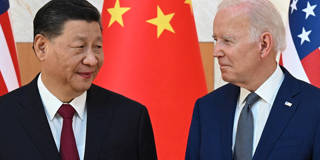At this week's US-China summit in San Francisco, the growing threat of a full-blown crisis on the Korean Peninsula must not be ignored. China is still the first stop on the road to managing the regional arms race and the growing danger that tensions could lead to conflict.
NEW HAVEN – When US President Joe Biden and Chinese President Xi Jinping meet for four hours on Wednesday before the Asia-Pacific Economic Cooperation Leaders’ Meeting in San Francisco, there will be much to discuss. In addition to Russia’s war on Ukraine, tensions over Taiwan, and the ongoing confrontation in the South China Sea, the Israel-Hamas conflict and how to keep it from escalating will be high on the agenda. So, time will be short, and the discussions will be difficult, but one important topic should not be missed: North Korea.
In the past, US-China summits often focused on how to head off the danger posed by North Korea’s growing and increasingly sophisticated arsenal of nuclear weapons and ballistic missiles. One US administration after another – Republican and Democratic alike – believed the road to achieving America’s ultimate objective, North Korea’s denuclearization, ran through China, the North’s patron. All were disappointed, although all found some common ground that helped manage the threat, as well as uncontrolled tensions that could lead to a second Korean war.
Now, the hardening of geopolitical battlelines, with the United States on one side and China and Russia on the other, has made cooperation almost impossible. Moreover, North Korean leader Kim Jong-un has taken full advantage of the new divide, casting aside the decades-old effort to normalize relations with the US begun by his grandfather, Kim Il-sung, to throw in his lot with Russia and China. This was clear from Kim’s recent summit in Russia with President Vladimir Putin, North Korea’s shipments of conventional weapons to Russia for use in Ukraine, and speculation that Russia may aid the North’s development of weapons of mass destruction.

NEW HAVEN – When US President Joe Biden and Chinese President Xi Jinping meet for four hours on Wednesday before the Asia-Pacific Economic Cooperation Leaders’ Meeting in San Francisco, there will be much to discuss. In addition to Russia’s war on Ukraine, tensions over Taiwan, and the ongoing confrontation in the South China Sea, the Israel-Hamas conflict and how to keep it from escalating will be high on the agenda. So, time will be short, and the discussions will be difficult, but one important topic should not be missed: North Korea.
In the past, US-China summits often focused on how to head off the danger posed by North Korea’s growing and increasingly sophisticated arsenal of nuclear weapons and ballistic missiles. One US administration after another – Republican and Democratic alike – believed the road to achieving America’s ultimate objective, North Korea’s denuclearization, ran through China, the North’s patron. All were disappointed, although all found some common ground that helped manage the threat, as well as uncontrolled tensions that could lead to a second Korean war.
Now, the hardening of geopolitical battlelines, with the United States on one side and China and Russia on the other, has made cooperation almost impossible. Moreover, North Korean leader Kim Jong-un has taken full advantage of the new divide, casting aside the decades-old effort to normalize relations with the US begun by his grandfather, Kim Il-sung, to throw in his lot with Russia and China. This was clear from Kim’s recent summit in Russia with President Vladimir Putin, North Korea’s shipments of conventional weapons to Russia for use in Ukraine, and speculation that Russia may aid the North’s development of weapons of mass destruction.